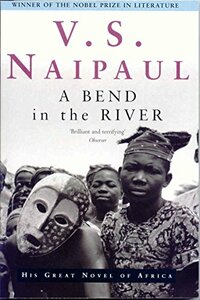Take a photo of a barcode or cover
reflective
tense
medium-paced
A Bend in the River is quite similar to A Passage to India. They deal with different time periods, and different countries, but both are contemporary looks at the state of a country and the effects of colonialism (the British Raj for A Passage to India, or newly independent Africa in A Bend in the River). Both books also share a common flaw - they both seem to get distracted from their main goal by other details. A Bend in the River was interspersed with interesting chapters, but in between these the story largely ground to a halt. The writing could be nice, the message the book tried to convey (or seemed to try to convey) was at times nicely displayed, and some of the characters were interesting, but still it seemed to be lacking some invigoration in its writing and story. It is a book worth reading, however I don’t think its that vital.
challenging
slow-paced
Diverse cast of characters:
Yes
Got to page 100 and realized how bored I was and stopped. I've been wanting to read this author,
so am disappointed. I glanced at other good reviews of the book - many of them say how acccurate his
description of Africa is, then I saw one that said he was a lousy storyteller and thought yes! I'm not engaged
in the story.
so am disappointed. I glanced at other good reviews of the book - many of them say how acccurate his
description of Africa is, then I saw one that said he was a lousy storyteller and thought yes! I'm not engaged
in the story.
challenging
dark
reflective
slow-paced
Plot or Character Driven:
Character
Strong character development:
Complicated
Loveable characters:
No
Diverse cast of characters:
No
Flaws of characters a main focus:
Yes
challenging
reflective
slow-paced
Loveable characters:
No
Diverse cast of characters:
Yes
Absolutely nothing happened. It was a disjointed mess of pointless descriptions and moot events that amounted to a steaming pile of wasted time.
Really appreciated the perspective that showed how conflicting people ideas and belief about people can be. At this point it feels dated, but also insightful into this time period to help us understand how long it takes for thoughts and beliefs to change.
A fictionalised examination of post-colonial Africa told from the perspective of an Indian man travelling from his family’s East African home to an invented central African state. Written in the late 1970s, it explores Naipaul’s ideas about modern Africa, with more emphasis on dialectic than character and plot. Despite some interesting insights and occurrences, the narrator’s style is often lifeless and unengaging, making this more of an intellectual read than a fully realised novel.



